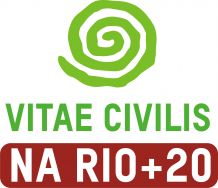This is LAB’s translation of Vitae Civilis’ summary of the gaps in the official declaration of Rio+20 (‘The Future We Want’):
 Rio+20 was called precisely because the commitments of Rio-92 were not fully met. In the last 20 years we have had serious problems of implementation, for want of the necessary structures. But what is notably absent from the Rio+20 document is means of implementation. Technology, resources, nothing is defined, but simply mentioned as an intention.
Rio+20 was called precisely because the commitments of Rio-92 were not fully met. In the last 20 years we have had serious problems of implementation, for want of the necessary structures. But what is notably absent from the Rio+20 document is means of implementation. Technology, resources, nothing is defined, but simply mentioned as an intention.
On the green economy, the text reaffirms different approaches, visions, models and tools to be considered in each country. While on the one hand this avoids having an inflexible model, the subsequent lack of practical decisions leaves open the possibility that anything can be classified as “green economy”, reinforcing the treacherous practice of “greenwashing”.
In the section on institutional arrangements for sustainable development – so-called “governance” – the main point of Rio+20 was the decision to set up a high-level political forum. Society’s demand was for a reform of the UN to raise the status of environmental issues within the system. But the setting up of this forum just kicks the can down the road, because there is no guarantee that it will work any better than the body it is intended to succeed, the Sustainable Development Commission. The change is an implicit recognition that the Commission has not functioned effectively.
There was renewed stress on the role of the UN Economic and Social Council (ECOSOC), while it would have been desirable instead to go beyond the concept of development expressed solely in socio-economic terms. The reform or abolition of ECOSOC would have represented the updating of the UN to the paradigm of sustainable development and an integrated vision of its various dimensions in the 21st century.
The advances on governance were timid. The social pillar merely reaffirmed the role of ECOSOC. In the environmental pillar, the issue was kept within the sphere of UNEP, the UN Environmental Programme. This now has a wider remit and a promise of more resources, but without the hoped for upgrade to an agency or a world organisation. In the financial pillar, no figures. On this last point, the good news is that the UN emerges strengthened, since some financial decisions will now be able to come before the General Assembly, thus breaking the stranglehold of the G20. The proposal is that the General Assembly should analyse options for a global strategy for financing sustainable development by 2014.
The original statement in Portuguse can be found here.

